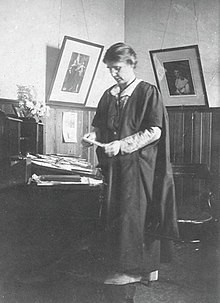Lucy Gwynn | |
|---|---|
 Lucy Gwynn at Trinity College Dublin, c.1912 | |
| Born | 22 September 1865 County Donegal, Ireland |
| Died | 1947 County Clare, Ireland |
Lucy Penelope Gwynn (1865-1947) was the first woman registrar of Trinity College Dublin. [1] [2]
Lucy Gwynn | |
|---|---|
 Lucy Gwynn at Trinity College Dublin, c.1912 | |
| Born | 22 September 1865 County Donegal, Ireland |
| Died | 1947 County Clare, Ireland |
Lucy Penelope Gwynn (1865-1947) was the first woman registrar of Trinity College Dublin. [1] [2]
Lucy Gwynn was born in County Donegal in Ireland. Her father John Gwynn was a Syriacist and Regius Professor of Divinity at Trinity College Dublin. [3] [4] Her mother was Lucy O'Brien, daughter of MP William Smith O'Brien. [4] Her eight brothers included the author and politician Stephen Gwynn, the academic Edward Gwynn, the career soldier Major General Sir Charles Gwynn, the cricketers Lucius Gwynn and Arthur Gwynn, the academic cleric and social reformer Robin Gwynn, the Indian civil servant and journalist Jack Gwynn and the Irish civil servant Brian Gwynn. [4] [5] She had one sister, Mary Gwynn, the wife of Henry Bowen and stepmother of the writer Elizabeth Bowen. She was a greatniece of Harriet Monsell (1812-1883). [5]
Lucy Gwynn was appointed first lady registrar of Trinity College Dublin in February 1905. [6] Trinity College had finally admitted women to the university just the year before, in 1904. [7] Despite coming from a family of academics Lucy Gwynn had been unable to get a university education herself. She was 39 years old when appointed to her position in the university.
Students described Lucy Gwynn as a pioneer. Her role as women's registrar was described by one of her charges as "to control our movements to some extent and to protect the college and the students from criticism". [6]
In 1907 Lucy Gwynn was summoned before the Fry Commission on Dublin University to defend the position of women at Trinity. She was supported by the parents of the students. The result was that the commission endorsed the principle of women's admission to the university. [6]
In 1922, the Dublin University Women Graduates’ Association was founded, under Lucy Gwynn's presidency. [8]
Lucy Gwynn never married. As an eldest daughter she was required to assist in the management of her parents' household and attend to them in their old age. From her mother's brother Robert Donough O'Brien (1844-1917), an architect, she inherited the house he had designed and built at Parteen-a-Lax in County Clare, close to Limerick City. It was there that she retired at the end of her working life. Her hobby was tending its beautiful garden which lay next to the river Shannon. [9]
Founded, by subscription, in 1948 in memory of Lucy Gwynn it is awarded annually in the Michaelmas term to a Junior Sophister woman student for distinction in her course. The award is made by two women on the university staff nominated by the Board, and one of the female tutors. The value of the prize is €1,207. [11]